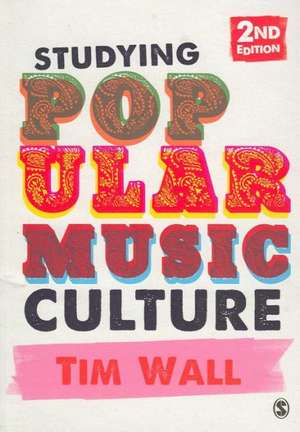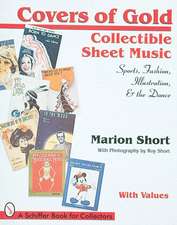Studying Popular Music Culture
Autor Tim Wallen Limba Engleză Paperback – 12 mar 2013
- Dr Nathan Wiseman-Trowse, The University of Northampton
Popular music entertains, inspires and even empowers, but where did it come from, how is it made, what does it mean, and how does it eventually reach our ears?
Tim Wall guides students through the many ways we can analyse music and the music industries, highlighting crucial skills and useful research tips. Taking into account recent changes and developments in the industry, this book outlines the key concepts, offers fresh perspectives and encourages readers to reflect on their own work. Written with clarity, flair and enthusiasm, it covers:
- Histories of popular music, their traditions and cultural, social, economic and technical factors
- Industries and institutions, production, new technology, and the entertainment media
- Musical form, meaning and representation
- Audiences and consumption.
Preț: 343.73 lei
Nou
Puncte Express: 516
Preț estimativ în valută:
65.79€ • 71.49$ • 55.30£
65.79€ • 71.49$ • 55.30£
Carte disponibilă
Livrare economică 31 martie-14 aprilie
Livrare express 14-20 martie pentru 40.13 lei
Preluare comenzi: 021 569.72.76
Specificații
ISBN-13: 9781446207727
ISBN-10: 1446207722
Pagini: 332
Dimensiuni: 170 x 242 x 18 mm
Greutate: 0.57 kg
Ediția:Second Edition
Editura: SAGE Publications
Colecția Sage Publications Ltd
Locul publicării:London, United Kingdom
ISBN-10: 1446207722
Pagini: 332
Dimensiuni: 170 x 242 x 18 mm
Greutate: 0.57 kg
Ediția:Second Edition
Editura: SAGE Publications
Colecția Sage Publications Ltd
Locul publicării:London, United Kingdom
Recenzii
Tim Wall's Studying Popular Music Culture is that rare thing, an academic study of music that seeks to tie together the strands of the musical text, the industry that produces it, and the audience that gives it meaning. Wall acts as a wary guide to an industry that is currently in total flux, showing the reader how conventional histories of popular music are shaped by social, industrial and technical factors that ultimately leak over into the ways in which we listen to and interpret music. The new edition provides a timely account of the history of the recorded music industry as it responds to new technologies and industrial approaches, with an ever-keen eye on how industrial practice relates to the ways in which audiences consume and use popular music in a variety of ways. Wall's lucid style provides a coherent summary of a cultural form that is never easy to grapple with at the best of times. Studying Popular Music Culture is a vital read for anyone interested in the changing nature of popular music production and consumption, whether as student, an industry insider or just a fan of popular music.
Dr Nathan Wiseman-Trowse
The University of Northampton
Dr Nathan Wiseman-Trowse
The University of Northampton
Cuprins
Introduction: Definitions and Approaches
PART ONE: HISTORIES
Constructing Histories of Popular Music
Musical and Cultural Repertoires
Social, Economic and Technical Factors
Writing Popular Music History
PART TWO: INDUSTRIES AND INSTITUTIONS
An Overview of Popular Music Production
Taking Issue with the Record Industry
Popular Music and the Media
PART THREE: FORM, MEANING AND REPRESENTATION
Form
Meaning
Representation
PART FOUR: AUDIENCES AND CONSUMPTION
The Sociology of the Music Consumer
Listening, and Looking
Dancing
Acquiring, Organising and Sharing music
PART ONE: HISTORIES
Constructing Histories of Popular Music
Musical and Cultural Repertoires
Social, Economic and Technical Factors
Writing Popular Music History
PART TWO: INDUSTRIES AND INSTITUTIONS
An Overview of Popular Music Production
Taking Issue with the Record Industry
Popular Music and the Media
PART THREE: FORM, MEANING AND REPRESENTATION
Form
Meaning
Representation
PART FOUR: AUDIENCES AND CONSUMPTION
The Sociology of the Music Consumer
Listening, and Looking
Dancing
Acquiring, Organising and Sharing music
Notă biografică
Descriere
A fully revised and updated edition of this widely adopted textbook. The First Edition was published in 2003 by Hodder.











